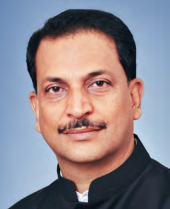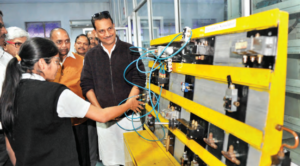Rajiv Pratap Rudy
Biz@India
June 2017

RAJIV PRATAP RUDY, Minister of State (Independent Charge), Ministry of Skill Development and Entrepreneurship (MSDE)
The Ministry of Skill Development and Entrepreneurship (MSDE) is setting the groundwork for India’s future with new schemes and strategies to skill the nation’s youth, says Rudy.
MSDE is revamping its strategies and launching new schemes to make India the ‘skill capital of the world’. Rajiv Pratap Rudy, minister of state (Independent Charge), MSDE, talks to Biz@India about the persisting problems, future goals, initiatives and more.
The ministry will complete three years under the leadership of the National Democratic Alliance (NDA) government. What have been the targets and also the achievements during the tenure?
The ministry will complete its three years on November 9, 2017. So technically, this ministry is just two and half years old. Spread over 20 ministries – having over 50 schemes – skilling was not a priority in India. Converging the skilling mandate into one ministry and building a mission mode approach has been my priority. It is now that the results are beginning to show. From ‘Pradhan Mantri Kaushal Vikas Yojana’ (PMKVY) 2.0 and National Apprenticeship Promotion Scheme (NAPS) to Recognition of Prior Learning (RPL) Scheme, we have created accountable ecosystem of skills and established a definition of skill for whom, how, where, and for what purpose. RPL for example, follows Prime Minister Narendra Modi’s vision of recognising skills of members of the workforce who have acquired their skills through heredity and we are issuing certificates and recognising their independently acquired informal skills, wherein we offer a short orientation course and issue certificates to them.
Prior to this ministry getting established, there was no definition and standard of skills. According to a data by National Sample Survey Office (NSSO), only about two pc work force in India was skilled a year ago. However, this data did not consider majority of verticals, which actually have skills. The data never captured existing skill sets required for entry level professionals like gardeners, drivers, beauticians, etc. Our ministry is filling the huge demand existing today at the entry level in non-formal sectors.
What is your vision for skill development in India? Can you please specify some strategies and policies for growth in the skill development sector?
For the first time in 68 years of India’s independence, a MSDE was formed in 2015 to focus on enhancing employability of the youth through skill development. Our vision is to make India the skill capital of the world and aim to skill 402 million youth in India by 2022.Vocational training needs to be made aspirational to transform India into the skill capital of the world. In line with the same, MSDE intends to establish visible and aspirational model training centres in every district of the country. These training centres will be state-of-theart Model Training Centres (MTCs), called ‘Pradhan Mantri Kaushal Kendra’ (PMKK). So far, 158 PMKK centres have been established and work is going on in an additional 112 districts to set up these model training centres.

Minister Rajiv Pratap Rudy at an Industrial Training Institute in Jamshedpur, Jharkhand (East India)
What are the priority areas and goals for 2017-18? What are the key achievements made so far?
Our objective will be to achieve scale while maintaining quality. Out of all the achievements of MSDE, some of the key achievements include, training more than 11.7 million people under MSDE programmes, 2.65 million candidates trained under MSDE’s flagship scheme PMKVY, over 482,000 people brought into organised sector through recognition of prior learning program under PMKVY, which recognises existing skills and certifies youth, amongst many others. To cater to the increasing demand for drivers, MSDE also launched Driver Training Institutes across the nation with a target to open 50 of them by the end of 2017. Other achievements include special schemes like ‘Udaan’ in Jammu & Kashmir (J&K) and others in north-east India, which have brought avenues of growth and opportunities to youth in these focused regions, India’s partnership with 11 countries in the skills agenda promoting global mobility, etc.
What are the challenges prevailing in the skill development area and how do you plan to overcome them?
To begin with, the biggest challenge would be of social perception. For example, being a plumber, carpenter or a driver requires a requisite skill set and if the same is complimented by a certain level of soft skills – interpersonal skills, communication skills and social acceptance; such small businesses can be optimised in favour of the professional. For this, it is important to capture the data of currently skilled individuals and record their prior learning experiences and certify them under a pan-India uniform umbrella.
The second and most important aspect would be to create a positive perception of traditional skill sets, which we as a people, take for granted. An individual investing his/her energy and resources towards a diploma or a degree that is unlikely to concur with the individual’s projected skill/career graph should try to grasp a lucrative skill set of his/her choice from the onset of secondary education.
Chasing wrong qualifications only to gain social acceptance by being tagged as ‘educated’ should not be the approach. Certification and skill can also be sought through other mediums that the ‘Skill India’ ecosystem hopes to provide. So, a factory technician, weaver, plumber or a carpenter should be taught to be enterprising in their own professional spheres and the consumers of these services should respect these businesses and not drive a hard bargain.
Another important aspect here would be that of uniformity and common norms. There were multiple ministries running multiple schemes (20 ministries – 70 schemes) and then in 2015, MSDE was conceived. Our efforts have been directed to bring skilling under a single umbrella and reduce multiplicity of agencies involved. For example, the Directorate General of Training (DGT) was transferred to us by the Ministry of Labour and the Training component was further transferred from the Department of North Eastern Region.
Therefore, one must note that policy interventions in the form of National Skill Development Policy of 2015, common norms and the National Board for Skill Accreditation and Certification are only strengthening the old system and laying groundwork for long term skill development in India.
Even after initiatives have been taken to bridge skill gaps in India, the problem still persists. What do you think are the reasons?
The skill gap data was derived only a year ago and such a change will not be visible overnight. India saw the maximum number of first time voters in its history in 2014. Every year new members are added to the workforce. We our increasing our infrastructural capacities every day, be it Driver Training Institutes or PMKKs or PMKVY centres. Good things take time and we are not selling durable goods that are easily tangible. We are laying the groundwork for India’s future and the future of our children. Right qualification packs, right curriculum, tools, exposure, infrastructure and mobility, are delicate matters and one wrong and hurried step could lead to serious problems for someone’s future.
Large number of jobless youth from smaller towns and rural areas are migrating to big cities in search of jobs. How are you planning to boost entrepreneurship amongst them?
Our focus, through the entrepreneurship scheme, will be to educate and equip potential and early age entrepreneurs across the country right at the lower segment of the society. The definition of entrepreneurship is not limited to just new app developers or e-commerce platform creators, but it is actually for young people of the country who have a certain skill set but do not have the art to bring their skills to market and earn a livelihood from it.
For example, a young girl in her village who does a skill development course in beauty and wellness is given a beautician kit to help her set up can actually urge many like her to set their own venture and earn a living for themselves. Entrepreneurship is a mandatory module integrated into every curriculum so that the youth can make up their mind to decide whether they want to search for a job in the same skill set or wish to set up their own venture.
Access to skilled talent pool has become a challenge for Indian companies; how serious is this challenge for you and what measures is the government taking to ensure adequate skilled manpower?
Employability is quite a concern across industries these days. With the advent of new technologies and job roles, there is a continuous need for skilling, up-skilling and re-skilling. We have to upgrade our workforce to the industry’s requirement today. Companies are delaying expansions because of lack of skilled labour. The essence of ‘Skill India’ is to bridge this skill gap.
Our ministry is taking some firm steps to bridge this demand-supply gap. To name a few, we are working on empowering Industrial Training Institutes (ITIs), intending to establish PMKKs in every district of the country, creating model skill development centres in every parliamentary constituency and planning to establish sufficient number of Driver Training Institutes to cater to growing demand of the industry.
Can you share some data regarding certified skill development institutes in India? How many people have received certificates in the last one year?
There are total 6,952 National Skill Development Corporation (NSDC) training centres in India now. MSDE has trained more than 11.7 million aspirants in various skills through MSDE schemes and programmes since the inception of ‘Skill India’; 2.65 million candidates are trained under MSDE’s flagship scheme PMKVY. More than 1,381 new ITIs have been opened with over 500,000 seats and the entire ecosystem of ITIs have been reinvigorated and re-energised.
Do you have any European collaboration or is there any collaboration underway?
MSDE is actively engaging with other countries in skill development through collaborations with foreign governments and institutions. A Memorandum of Understanding (MoU) was signed between the European Commission and Department of Economic Affairs, Ministry of Finance in June 2014, to contribute in the implementation of the skill development policy of the Government of India. A number of study tours, delegation visits and technical assistance programmes have taken place through this collaboration, and the project is nearing completion. Countries like Sweden, Germany, France and the United Kingdom, are deeply investing in India and my ministry actively coordinates with their trade delegations and counterparts on pertinent issues.









